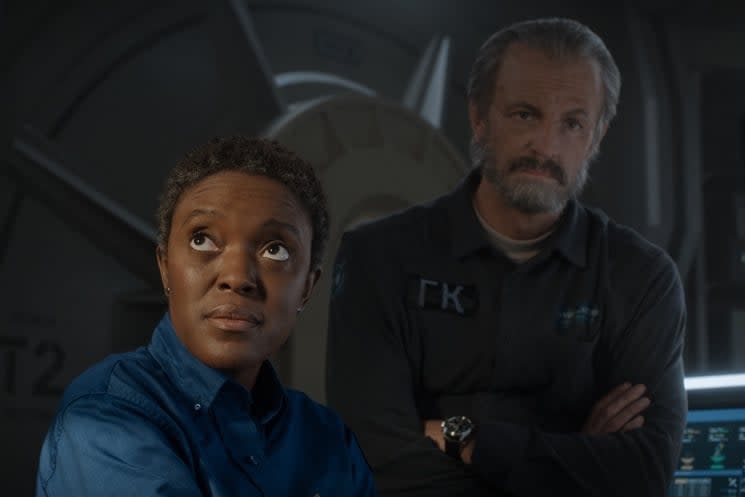For All Mankind's elevator pitch — an alternate version of history in which the Soviets get to the moon first and the space race continues — is irresistible. But, after three past seasons exploring this concept across several decades, the butterfly effect has fully set in, and the world of the show is mostly disconnected from our reality. With humans having settled on the Moon and Mars, this isn't so much an intriguing riff on history as a completely different version of it.
Perhaps because of this growing disconnect between the show's world and our own, For All Mankind's focus has gradually shifted away from space and onto interpersonal relationships, with the past couple seasons introducing tangled in a web of affairs, breakups and addictions. This has given the show an unwelcome soapy quality — particularly in the infamous Danny/Karen storyline, which brought a major "ick" factor to the end of Season 2, and bogged down Season 3 in dull moping.
Thankfully, For All Mankind has steered its spaceship back into orbit with Season 4: Danny and Karen are gone, thank god, and the focus is mostly on extraterrestrial exploration rather than interpersonal drama. We've jumped forward eight years, to 2003, when travelling to Mars has become routine, and the latest frontier is mining asteroids for valuable metals.
The stakes feel a little lower than in past seasons: instead of travelling to new planets, the breakthroughs here involve resource extraction. But the show finds new sources of drama: former NASA flight director Margo Madison (Wrenn Schmidt) has defected to the USSR, and she's living a bleak life in a 1984-style police state as Cold War tensions rise. Schmidt makes a valiant but conspicuously awkward attempt to speak Russian — but it's otherwise a compelling glimpse behind the Iron Curtain from a show that has previously focused exclusively on the American point of view.
Another interesting new angle comes courtesy of blue-collar worker Miles Dale (Toby Kebbell), a one-time oil rig roughneck who gets a job on Mars. There, he learns that class divisions are just as firmly entrenched in space as they are at home, and he gets pulled into a subculture of speakeasy partying and labour unrest. Much like standout Star Wars series Andor, it's a compelling depiction of a relatable class struggle within a sci-fi context.
For All Mankind may have lost the novelty factor of its fantastic concept, but it's charted a compelling new path that depicts earthly class struggle and political tension on the frontiers of space. Even in this alternate version of reality, humanity remains the same.
(Apple TV+)Perhaps because of this growing disconnect between the show's world and our own, For All Mankind's focus has gradually shifted away from space and onto interpersonal relationships, with the past couple seasons introducing tangled in a web of affairs, breakups and addictions. This has given the show an unwelcome soapy quality — particularly in the infamous Danny/Karen storyline, which brought a major "ick" factor to the end of Season 2, and bogged down Season 3 in dull moping.
Thankfully, For All Mankind has steered its spaceship back into orbit with Season 4: Danny and Karen are gone, thank god, and the focus is mostly on extraterrestrial exploration rather than interpersonal drama. We've jumped forward eight years, to 2003, when travelling to Mars has become routine, and the latest frontier is mining asteroids for valuable metals.
The stakes feel a little lower than in past seasons: instead of travelling to new planets, the breakthroughs here involve resource extraction. But the show finds new sources of drama: former NASA flight director Margo Madison (Wrenn Schmidt) has defected to the USSR, and she's living a bleak life in a 1984-style police state as Cold War tensions rise. Schmidt makes a valiant but conspicuously awkward attempt to speak Russian — but it's otherwise a compelling glimpse behind the Iron Curtain from a show that has previously focused exclusively on the American point of view.
Another interesting new angle comes courtesy of blue-collar worker Miles Dale (Toby Kebbell), a one-time oil rig roughneck who gets a job on Mars. There, he learns that class divisions are just as firmly entrenched in space as they are at home, and he gets pulled into a subculture of speakeasy partying and labour unrest. Much like standout Star Wars series Andor, it's a compelling depiction of a relatable class struggle within a sci-fi context.
For All Mankind may have lost the novelty factor of its fantastic concept, but it's charted a compelling new path that depicts earthly class struggle and political tension on the frontiers of space. Even in this alternate version of reality, humanity remains the same.
